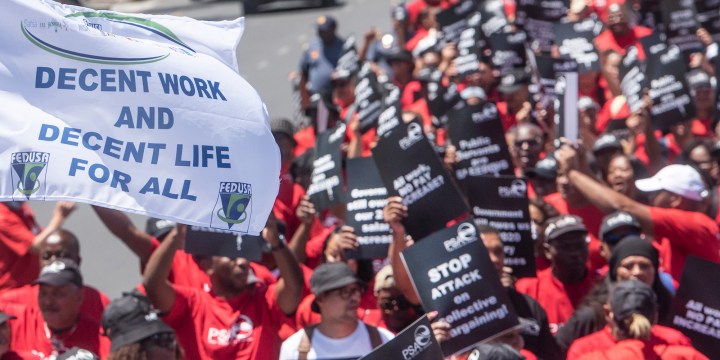PUBLIC SECTOR PAY
Treasury adopts a new approach to rein in bloated public servants’ wage bill

Treasury will provide new money to fund pay increases for critical and personnel-heavy professions; others will be funded from departments’ existing budgets.
The government has taken a new approach in an attempt to rein in the rising cost of paying public servants: only give increases to frontline and labour-intensive professions. National Treasury has allocated R111.4-billion over the next three years to adjust the pay of public servants in the departments and professions that it deems to be critical, such as education, health, police, defence and correctional services.
It is a step change in how Treasury approaches remuneration in the state. In previous years, all public servants, regardless of which department they worked in, would be in line to receive a pay rise.
Of the R111.4-billion pencilled in by Treasury, about R24-billion will immediately go towards helping to fund pay increases of 7.5% for public servants in the current fiscal year (2023/24) that it didn’t fully budget for, which left a big hole in public finances.
The balance will go towards remuneration only in personnel-heavy sectors, including health, education and the police service, over the next three years.
Since 2020, Treasury has attempted to implement a pay freeze in the public sector to stabilise the cost of paying SA’s 1.2 million public servants. But it failed to do so as it faced pushback from public sector trade unions, which embarked on several strikes.
Set at R646.4-billion in 2023/24, the cost of paying public servants is the single largest component of government expenditure. It gobbles up 30% of total expenditure of R2.26-trillion in the current fiscal year, crowding out spending on capital projects for future growth as well as items crucial for service delivery. In other words, 30% of the government’s expenditure goes to just 2% of the population (public servants).
Ballooning public sector pay
An analysis by Treasury of public sector pay – contained in the 2023 Medium-Term Budget Policy Statement documents – found that unsustainable pay levels since 2013 have resulted in more public servants moving into higher-earning categories. The number of public servants with annual earnings of more than R1-million has increased from just more than 10,000 in 2013/14 to over 55,000 in 2023/24.
Almost half (48%) of public servants will earn between the annual ranges of R350,001 and R600,000 in 2023/24, Treasury found.
It is struggling to wrestle down the cost of compensation. Its projections show that the cost to remunerate public servants or compensation cost will continue to rise over the next three years, from R646.4-billion in 2023/24 to R720.3-billion in 2026/27.
But Treasury is now intent on limiting above-consumer inflation percentage increases to the pay of public servants, which has been the main driver of the growth in the compensation cost since 2013.
To this end, Treasury is now prepared to allocate new money to frontline and labour-intensive professions. For others, it is increasingly asking provincial government departments to accommodate pay increases from their existing budgets.
However, provinces argued that it would be unfair for the national government to negotiate unaffordable pay increase settlements centrally and then to deny provinces the funds to implement them. Treasury was sympathetic to the argument as it provided partial funding of R17.6-billion for provinces to be able to implement pay increases.
However, a Treasury official told Daily Maverick that asking provinces to bankroll pay adjustments for public servants independently, especially those whose professions are deemed not to be labour intensive, would be the norm in future.
“Departments will be expected to absorb the wage increases within their baselines, including, where necessary, by managing headcounts. The government will assist in managing headcounts, including implementing controls on payroll systems to ensure executive authorities operate within their budgets when creating and filling vacant posts,” said the official.
The labour movement response
Trade unions and federations are divided on Treasury’s new compensation approach.
Reuben Maleka, the general manager of the Public Servants’ Association (PSA), welcomes the allocation of additional money to frontline professions but said Treasury’s insistence on managing headcount (the possible freezing of posts) will harm service delivery.
“These measures will have a negative effect on filling vacancies while there is a critical need to fill such vacancies. Public servants’ capacity is stretched to the limit and this impacts on their ability to render efficient services to citizens,” said Maleka. The PSA claims to represent more than 245,000 public servants.
Matthew Parks, the acting national spokesperson and parliamentary coordinator of labour federation Cosatu, agreed with Maleka. “What it will do is fuel the brain drain of skilled public servants to better paying and less stressful jobs overseas. We should not fall for a reckless narrative that says the public service is bloated. In 1994, we had one million public servants for 34 million South Africans. Today, we have 1.2 million public servants, yet the population has nearly doubled to 62 million,” said Parks.
What might undermine Treasury’s plans to limit above-consumer inflation pay increases is that the two-year compensation agreement it signed with public sector trade unions – running from 2023 to 2024 – will soon end. Maleka said the union “will probably table [pay] demands during the third quarter of the 2024/25 fiscal year”.
Another risk to Treasury’s projections for the money it would allocate over the next three years was the impact of inflation, said Peter Attard Montalto, the managing director of consultancy firm Krutham.
“Wage bill pressures were fully recognised now we are in a two-year agreement, though we think National Treasury marginally underestimates the [wage/pay] bill from next year given higher inflation and in the medium run, given we see some attrition [reduction in headcount as public servants retire and for other reasons],” said Attard Montalto. “As such, through the next three years, we have an extra R23-billion of wage spending.” DM
This story first appeared in our weekly Daily Maverick 168 newspaper, which is available countrywide for R29.




















Good luck with that.
“Public servants’ capacity is stretched to the limit and this impacts on their ability to render efficient services to citizens,” said Maleka.
To do what – steal? And be useless. (Not in the Cape, though. They earn their money!)
“What it will do is fuel the brain drain of skilled public servants to better paying and less stressful jobs overseas.” I doubt that there are better paying, less stressful jobs than being an SA govt employee anywhere on the planet?!
Is there such a thing? Highest paid and lowest productivity public sector in the world
The easiest and fastest way to reduce this spend is to freeze all new appointments. Stop replacing staff that resigns, are dismissed or go on pension unless absolutely necessary. Any new appointments should only be allowed if approved by one single person with the knowledge to know whether required and also the guts to reject. Non performing personnel should be properly disciplined and dismissed if found guilty. Suspension of staff on full pay should not go passed the 76 hours required by law before a hearing can take place. Nowhere in the private sector will you have employees on suspension any longer. In the SOE’s suspended employees are paid for years whilst they do nothing. This rot should be curbed immediately.
And you’ll still be stuck with the useless deadwood. Best to get rid of the mostly unproductive waste and employ people who WANT to work
All the above comments are relevant. 245 000 public servants and we still get second rate service.
No more jobs for pals, cadres, comrades, call them what you will. Only people with skills and qualifications should be employed.
The ANC government is completely useless and they are hell bent on destroying this country!!! DOWN WITH THE ANC!!!!!
Please don’t count teachers among the “public servants”. For years, we got a 1% pay appraisal linked increase while pen pushers got 1 1/2%. In the COVID years we did not get an increase at all, and subsequently we were paid a R1000 non-pensionable “allowance”. This has now been included in our salaries and is considered part of the untrue “salary increase”. The appraisal notch has now fallen away.
I am now in the 42% bracket, but it has taken me 41 years to get there. If I were in any one of the other professions, I would be earning twice that.
Sure, you’re right. You sadly live in a country with a government that does not have even a vague understanding of the essence of education, systems that are a shambles and many teachers that have no the interest in anything other than their paycheck? So sad, so destructive, so dumb.
Welcome to the fate of teachers worldwide. It’s just despicable how education is becoming a luxury for the fortunate (rich) few.
SADTU certainly doesn’t help, they’ve been complicit in destroying the education sector in SA
Matthew Parks’ comment is valid: In 1994 there were 1 million public servants for 34 m people now there are 1.2 m for 62 (we think) m people. The ANC is just following precisely what the NP did before, employing their voters, no matter how useless they are.
Yes, maybe, but that million actually DID something. This lot are just cadavers, sorry cadres, who are mainly absolutely useless, although you could say that’s a result of bantu education, although I doubt it.
It is on the outside an impressive soundbite, however in 1994 we had battery powered calculators, computers the size of small cars and barely any connectivity and hand filled forms prepared in triplicate with blue copy paper.
Now we have super fast processing power, wifi, Watsapp, zoom and a far higher %age of the population online most of the day even if only by smart phone.
The time taken to process one document has fallen from 1-2/hour to hundreds – so really Mr Parks’ should be noting that the 1 million employees should have FALLEN to about 100,000 over this period due to increased efficiency through technology.
The “zombie cadres” line seems to make more sense now
Very good point. I did an internship at the then CPA in late ‘80s, there were three floors for the typing “pool”; probably 200 or 300 typists. Same at the City Council. All gone.
My mind boggled at the thought that 30% of government spending goes to 2% of the population. Particularly when a large proportion of that 2% provide absolutely nothing in terms of service delivery. We are SO screwed, it’s beyond rescue. Anyone with a handy miracle in the wings?
I chocked on my tea!! R700,000,000,000.00 for 1,800,000 state employees…🤯
It’s utterly perverse! It’s a catastrophic.
And listen to those smug trade unionists- retching stuff.
Sorry for you! Looking much like the anc has run out of other people’s money! Socialism at its best!
Our public wage bill is nothing more than a barely disguised bulk payment for anc votes.
Until primary education, basic services, public transport, health, and security are delivered effectively throwing money at anything to do with economic and social development is literally wasted, useless and self serving.
The problem isn’t merely the public wage bill (although that is part of the problem, of course.)
Not mentioned is the armies of consultants and consulting firms – vast, teeming swarms of them – that are appointed at vastly inflated prices to perform tasks of a technical-, managerial- or even administrative nature, which public servants are already employed to perform (and which government used to have to perform itself.)
This duplication of payment costs many, many billions every year.
(Similar to taxpayers supporting the police, schools, hospitals etc. but then still having to shell out for private armed response, inflated school fees and private medical aid.)
Totally agree. The “armies” of consultants and consulting firms are cash cows hired to perform the functions that the delinquent and incompetent civil servants should have the skills to perform. Lest we forget Bain & Co and the others.
Inflated public service, inflated number of ministers – and no service delivery. No money, no honesty – and no moral compass. This country is sadly heading for a collapse. The ANC must go!
How on earth do we wind up with a public service which is almost 1% of the country’s population!? And MORE than that of the adult population? AND all demanding (and getting) above inflation increases? I mean, the percentage of the population paying income tax is, I believe around 10% (Roughly 7.1 million of a population roughly 70 million) need to submit returns – this means, crudely, that roughly 17% of our tax payer base is paid for by the other 83%. Thats pretty insane.
**Total typo. I meant 17% of the countries tax paying population.
It’s a lot smaller than that
Sick and obscene levels of compensation. With a 100% success rate in destroying SOE’s that point does not even begin to be arguable……. fun thought to consider how much worse it could get if the EFF got it’s fingers into, perhaps into a better word, the state till.
ANC are chasing their tails, they are doomed because they have created a society of entitlement in an attempt to retain a majority voter base and everything is falling apart and the very same voter base has begun to understand the extent to which their leaders have plundered the countries resources and and all the failed promises mad.
What are the realities of the South African budget before we go on a tirade of blaming the public service numbers? We have had an economy that has been having an epileptic growth far below even the inflation targets set up by the government. We have a situation of loss of revenue as a result of the electricity problem and the logistics challenge of Transnet. It is very silly and disorderly for anybody to blame this on the public service. Any person with a coefficient of thinking would know that the economy will not grow with the two challenges of electricity and logistics. The estimated loss of revenue from electricity is R100 billion and from the logistics challenge is another R100 billion and the under collection is R56 billion and to blame it on the public service not the ANC government only sick people would do that. People must look at the lost investments because of the electricity and the logistics challenges as a result of corruption and incompetence by the ANC government. The question is whether there are credible plans to deal with these two challenges ought to be part of any plan to deal with the crisis. The answer is that we have a civil engineer who ought to be dealing with pot holes charged with dealing with the issue and is saying a lot of poppy cock on television along with the Minister of Public Enterprises who is adds to the confusion. To cut expenditure without clear plans on energy and logistics by people who tell us they dropped the ball will not help.
In a nutshell is the spice.
Your comments are too long. Brevity required.
Hahahahahahahahahaha
Any person with a coefficient of thinking would know that all three things can be true. That is low growth, declining tax revenues & an inefficient & costly Public Service.
What about your organisation? Complicit and actively engaging in tender fraud, bridges built in Limpopo that collapsed mere weeks after completion, massive fraud, theft, money laundering and stealing the pension funds of the most vulnerable in our society! No, your organisation has built absolutely nothing and have contributed absolutely nothing to our society and have left tens of thousands of people worse off than they were with your corruption. No, the eff is a bunch of radicals who only want power and IF they ever get it, they country is well and truly finished. So rather sit down an be quiet.
Conservation should be included in this. We need field rangers and officers in our protected areas
Serving the public and your fellow countrymen should be a calling. It should be done from a position of passion and loyalty to one’s country. It should be the greatest honor bestowed upon you.
Should.
Now, lets look at South Africa. We know that the ANC cadre deployment is a thing. Hell, they would protect it more than the citizenry.
We know the ANC’s position is party before country.
We know that not all animals are equal in South Africa.
I think most of us are smart enough to know where the problem is, and it’s not at the lower ranks, or as the doublespeak calls them, frontline and labor-intensive public servants.
So what if the ones who in it for self enrichment leave, let them go.
This government will always burden the lower ranks to favor the cadres.
How many high ranking politically connected public servants have been convicted for state capture.
A certain big fish didn’t even need to see a jail for contempt, although he cost us dearly.
Has anyone seen a scorecard for how well a minister does their work?
How does the President preside when he is always jetting abroad?
Would a millionaire President voluntarily take a salary cut?
Good luck treasury, and I hope you win, but I wouldn’t bet on it.
There are well over 2 million civil servants if all 3 tiers of government are taken into account, so don’t be fooled by selective hyperbole